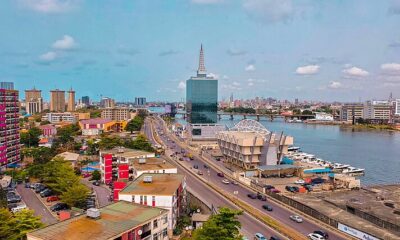BUSINESS
African airlines to transport 400million passengers in 2036
Published
7 years agoon
By
Reporter
The global projection released by the International Air Transport Association (IATA) estimated the traffic in Africa to consistently grow by 5.9 per cent over the next 20 years.
The growth rate, though marginal when compared with other continents, promises boom time for prepared airlines on both local and international routes.
IATA, in a forecast released on Tuesday, expects 7.8 billion passengers to travel in 2036, a near doubling of the four billion air travelers expected to fly this year. The prediction is based on a 3.6 per cent average Compound Annual Growth Rate (CAGR) noted in the release of the latest update to the association’s 20-Year Air Passenger Forecast.
IATA’s Director General and Chief Executive Officer (CEO), Alexandre de Juniac, said all indicators lead to growing demand for global connectivity.
“The world needs to prepare for a doubling of passengers in the next 20 years. It’s fantastic news for innovation and prosperity, which is driven by air links. It is also a huge challenge for governments and industry to ensure we can successfully meet this essential demand,” de Junaic said.
According to IATA, the biggest driver of demand will be the Asia-Pacific region. The region will be the source of more than half the new passengers over the next two decades.
The point at which China will displace the United States as the world’s largest aviation market (defined as traffic to, from and within the country) has moved two years closer since last year’s forecast.
“We now anticipate this will occur around 2022, through a combination of slightly faster Chinese growth and slightly reduced growth in the U.S. The UK will fall to fifth place, surpassed by India in 2025, and Indonesia in 2030. Thailand and Turkey will enter the top ten largest markets, while
France and Italy will fall in the rankings to 11th and 12th respectively.
Risks, opportunities and sustainability,” IATA stated in the report.
A number of risks to the forecast have been identified. Maximising the potential benefits of aviation growth will depend on current levels of trade liberalisation and visa facilitation being maintained.
If trade protectionism and travel restrictions are put in place, the benefits of air connectivity will decline as growth could slow to 2.7 per cent, meaning 1.1 billion fewer passenger journeys annually in 2036.
Conversely, if moves towards liberalisation increase, annual growth could be more than two percentage points faster, leading to a tripling in passengers over the next 20 years.
Planning for growth will require partnerships to be strengthened between the aviation industry, communities and governments to expand and modernize infrastructure. Runways, terminals, and ground access to airports will come under increasing strain.
Innovative solutions to these challenges, as well as to the baggage and security processes, cargo handling, and other activities, will also be needed. And air traffic management needs urgent reform to cut delays, costs and emissions.
“Increasing demand will bring a significant infrastructure challenge. The solution does not lie in more complex processes or building bigger and bigger airports but in harnessing the power of new technology to move activity off-airport, streamline processes and improve efficiency.
Through partnerships within the industry and beyond, we are confident that sustainable solutions for continued growth can be found,” de Juniac said.
The aviation industry has adopted a robust strategy to reduce its environmental impacts, particularly its carbon emissions.
“No industry has done more to meet its environmental obligations than aviation. Our tough targets to achieve carbon-neutral growth from 2020 and to cut our CO2 emissions to half-2005 levels by 2050 are backed by a comprehensive strategy.
“Our immediate aims are to work with governments to increase the production of sustainable aviation fuels, and to deliver air traffic management efficiencies, which promise significant emissions savings. And from 2020, a Carbon Offsetting and Reduction Scheme for International Aviation (CORSIA) will play a major role in meeting our carbon-neutral target,” de Juniac said.
The five fastest-growing markets in terms of annual additional passengers in 2036 compared to 2016 will be China (921 million new passengers for a total of 1.5 billion); U.S. (401 million new passengers for a total of 1.1 billion); India (337 million new passengers for a total of 478 million); Indonesia (235 million new passengers for a total of 355 million) and Turkey (119 million new passengers for a total of 196 million).
Many of the fastest-growing markets are achieving a compound growth rate of more than 7.2 per cent per year, meaning their market will double in size each decade. Most of these markets are in Africa, including: Sierra Leone, Benin, Mali, Rwanda, Togo, Uganda, Zambia, Senegal, Ethiopia, Ivory Coast, Tanzania, Malawi, Chad, Gambia and Mozambique.
Routes to, from and within Asia-Pacific will see an extra 2.1 billion annual passengers by 2036, for an overall market size of 3.5 billion. Its annual average growth rate of 4.6 per cent will be the third-highest, behind Africa and the Middle East.
The North American region will grow by 2.3 per cent annually and in 2036 will carry a total of 1.2 billion passengers, an additional 452 million passengers per year.
Europe will also grow at 2.3 per cent, and will add an additional 550 million passengers a year. The total market will be 1.5 billion passengers.
Latin American markets will grow by 4.2 per cent, serving a total of 757 million passengers, an additional 421 million passengers annually compared to today.
The Middle East will grow strongly (5.0 per cent) and will see an extra 322 million passengers a year on routes to, from and within the region by 2036. The total market size will be 517 million passengers.
- Guardian
You may like
-


5 Awesome Ancient African Beauty Practices
-


Moniepoint Reaches African Unicorn Status With $110 Million Funding Boost
-


Idris Elba To Relocate To Africa To Support Its Film Industry
-


Top 5 Smartphone Brands Dominating Africa’s Market
-


Lagos Is Africa’s Second Cheapest City You Can Live In
-


Here Are The Top 5 Cleanest Cities In Africa
BUSINESS
5 Success Tips For Start-Up Businesses In Nigeria
Published
4 weeks agoon
December 23, 2024
Nigeria’s entrepreneurial landscape is vibrant yet demanding, and success tips for start-up businesses in Nigeria are essential for navigating its challenges.
Achieving business success requires a combination of strategic planning, resilience, and a clear understanding of the market.
For start-ups, mastering these success tips for start-up businesses in Nigeria can help transform obstacles into opportunities and turn ideas into thriving ventures.
By adopting the right strategies, entrepreneurs can effectively launch and scale their businesses in Nigeria’s competitive environment.
These success tips for start-up businesses in Nigeria offer crucial insights into overcoming challenges, seizing opportunities, and building sustainable growth.
1. Develop a Robust Business Plan
Crafting a comprehensive business plan is fundamental for start-ups in Nigeria. Successful entrepreneurs recognise that a well-structured plan serves as a roadmap for growth. Your business strategy should include:
- Detailed market research
- Clear financial projections
- Competitive analysis
- Realistic operational strategies
Success tips for business always emphasise the importance of thorough planning. Nigerian start-ups must create flexible plans that can adapt to the dynamic economic environment.
2. Leverage Technology and Digital Platforms
Digital transformation is crucial for modern start-ups in Nigeria. Embracing technological solutions can significantly enhance business efficiency and market reach. Success tips for business in the digital age include:
- Utilising cloud computing
- Implementing robust cybersecurity measures
- Exploring e-commerce platforms
- Developing mobile-friendly interfaces
Start-ups in Nigeria must invest in technological infrastructure to remain competitive and innovative.
3. Build a Strong Network and Partnerships
Networking is a critical success tip for business growth in Nigeria. Building strategic relationships can open doors to opportunities, funding, and mentorship. Entrepreneurs should:
- Attend industry conferences
- Join professional associations
- Engage with local and international business communities
- Seek mentorship from experienced entrepreneurs
Successful start-ups in Nigeria understand that connections are as valuable as capital.
4. Secure Adequate Funding and Financial Management
Financial stability is paramount for start-ups in Nigeria. Success tips for business include:
- Exploring multiple funding sources
- Maintaining transparent financial records
- Understanding government grants and initiatives
- Developing sound financial management strategies
Nigerian entrepreneurs must be creative in securing and managing their financial resources.
5. Prioritise Customer Experience and Market Adaptation
Customer-centric approaches distinguish successful start-ups in Nigeria. Entrepreneurs should:
- Conduct regular market research
- Gather and implement customer feedback
- Stay agile and responsive to market changes
- Develop unique value propositions
Success tips for business always highlight the importance of understanding and serving customer needs effectively.
Additional Considerations for Nigerian Start-ups
Beyond these core strategies, start-ups in Nigeria must also:
- Navigate regulatory environments
- Understand local business cultures
- Develop resilience against economic fluctuations
- Continuously learn and upgrade skills
Conclusion
Success tips for business are not one-size-fits-all solutions. Start-ups in Nigeria must combine strategic planning, technological innovation, strong networks, financial acumen, and customer focus to thrive.
By implementing these strategies, Nigerian entrepreneurs can transform challenges into opportunities and build sustainable, successful businesses in an increasingly competitive global marketplace.
If you found this article helpful, continue reading here.

Myths about the job market can mislead job seekers and professionals navigating career transitions. Many individuals fall prey to outdated beliefs that no longer reflect the dynamic employment landscape.
Myths about the job market often include misconceptions about required qualifications, salary expectations, and career progression.
One prevalent myth suggests that a traditional four-year degree guarantees immediate employment when in reality, skills, adaptability, and networking play crucial roles.
Another widespread misconception is that changing careers is impossible after a certain age, which undermines the potential of experienced professionals seeking transformation.
Myths about the job market also perpetuate the idea that stability means staying in one role for decades. Modern career paths are increasingly non-linear, with professionals expecting to change jobs multiple times.
The solution lies in continuous learning, developing transferable skills, embracing technological advancements, and maintaining a flexible, growth-orientated mindset.
Myths about the job market can be debunked through proactive research, upskilling, and understanding emerging industry trends.
Let’s take a quick look at these myths and how to solve them below.
Myth 1: You Need a Four-Year Degree to Succeed
While a college degree can open doors, it’s not the only path to a fulfilling career. Many successful professionals have built thriving careers without a traditional degree.
Solution:
- Skill-Based Learning: Focus on developing in-demand skills through online courses, boot camps, or certifications.
- Networking: Build relationships with professionals in your desired field, regardless of their educational background.
- Freelancing and Gig Work: Gain experience and build a portfolio through freelance projects.
Myth 2: The Job Market is Saturated
It’s true that competition can be fierce, but there are still plenty of opportunities for skilled individuals. The key is to identify niche markets and unique value propositions.
Solution:
- Niche Down: Specialise in a specific area within your industry to stand out from the crowd.
- Continuous Learning: Stay updated on industry trends and emerging technologies to remain competitive.
- Personal Branding: Build a strong personal brand to attract potential employers and clients.
Myth 3: You Should Only Apply to Job Postings
While applying to job postings is a traditional approach, it’s not the only way to land a job. Proactive job hunting can yield better results.
Solution:
- Networking: Connect with people in your industry and let them know you’re looking for opportunities.
- Informational Interviews: Schedule informational interviews to learn about potential job openings and company culture.
- Cold Emailing: Reach out to hiring managers directly to express your interest in a position.
Myth 4: You Should Stay in a Job You Hate
Staying in a job you despise can negatively impact your mental health and career progression. It’s essential to prioritise your well-being and seek new opportunities.
Solution:
- Set Career Goals: Define your long-term career aspirations and create a plan to achieve them.
- Upskill and Reskill: Invest in your professional development to enhance your job prospects.
- Network Strategically: Build relationships with people who can help you find new opportunities.
Myth 5: The Job Market is Only for Young People
Age discrimination is a real issue, but it doesn’t mean older workers can’t find fulfilling careers. Experience and wisdom are valuable assets in the job market.
Solution:
- Highlight Your Experience: Emphasise your skills and accomplishments, focusing on how they can benefit your potential employer.
- Adapt to Change: Stay updated on technological advancements and industry trends.
- Mentor Younger Professionals: Sharing your knowledge and experience can boost your credibility and open doors to new opportunities.
Remember, the job market is constantly evolving. By debunking these myths and taking proactive steps, you can increase your chances of finding a fulfilling career.
So, don’t let these misconceptions hold you back. Keep learning, keep networking, and keep believing in yourself.
Key takeaways:
- Myths about the job market can hinder your job search.
- A four-year degree is not always necessary to succeed.
- Skill-based learning and networking can help you land a job.
- The job market is not saturated, but you need to niche down and continuously learn.
- Applying to job postings is not the only way to find a job.
- You should not stay in a job you hate.
- The job market is not only for young people.
- Older workers can still find fulfilling careers by highlighting their experience and adapting to change.
By understanding these myths and implementing the suggested solutions, you can empower yourself to navigate the job market with confidence and achieve your career goals.
Check out more updates here.
BUSINESS
Master The Art Of Budgeting In Business With These 5 Tips
Published
2 months agoon
December 2, 2024
Effective budgeting in business is crucial for success. It ensures financial stability and drives strategic growth. Whether you’re a small startup or an established company, proper budgeting in business helps control costs and maximize profits.
Here are five essential tips to master the art of budgeting in business.
1. Set Clear Financial Goals
Every successful budget starts with clear goals. Define what you want to achieve financially. Are you aiming to reduce costs, increase revenue, or expand operations?
Set specific, measurable, and realistic targets. This step provides direction and helps prioritize spending.
Align goals with strategy:
Ensure your financial goals align with your overall business strategy. For instance, if growth is a priority, allocate more resources to marketing and product development.
Budgeting in business becomes more effective when tied to clear objectives.
2. Track and Analyse Expenses
Understanding where your money goes is vital. Track all expenses, no matter how small. Categorise them into fixed (rent, salaries) and variable (utilities, supplies) costs.
Use accounting software to automate this process and reduce human error.
Review regularly:
Analyse your spending patterns monthly or quarterly. Identify areas where you can cut costs or optimise spending. Regular expense tracking ensures your budgeting in business stays accurate and adaptable.
Pro Tip:
Use historical data to forecast future expenses. This helps you prepare for seasonal fluctuations or unexpected costs. Knowing your spending trends enhances control over your finances.
3. Create a Realistic Cash Flow Forecast
Cash flow is the lifeblood of any business. A realistic forecast shows when money will enter and leave your business.
Include all income sources and expected expenses. This prediction helps you anticipate shortfalls and plan accordingly.
Why it matters:
A solid cash flow forecast prevents financial surprises. It ensures you have enough liquidity to cover day-to-day operations. Effective budgeting in business relies heavily on accurate cash flow management.
Example:
If you know a major expense is coming in a particular month, you can adjust spending in other areas. This proactive approach avoids cash shortages and keeps operations smooth.
4. Prioritise Essential Spending
Not all expenses are created equal. Identify which costs are essential for business operations and which are not.
Focus on spending that drives growth or maintains critical functions. Cut or postpone non-essential expenses during tight periods.
Evaluate ROI:
Assess the return on investment (ROI) for each expense. Prioritise high-ROI activities like marketing campaigns that generate leads or equipment upgrades that boost efficiency.
Budgeting in business becomes more impactful when resources are allocated wisely.
Key Areas to Prioritise:
- Payroll and essential staffing
- Marketing efforts with proven results
- Product development
- Maintenance of critical infrastructure
5. Monitor and Adjust Your Budget Regularly
A budget isn’t static; it’s a dynamic tool. Regular monitoring and adjustments are crucial. Compare actual performance against your budgeted figures.
Identify discrepancies and adjust as needed. This flexibility helps you respond to unexpected challenges or opportunities.
Stay proactive:
Review your budget monthly. If you’re consistently overspending in a certain area, investigate why. Maybe costs have increased, or perhaps there’s inefficiency.
Adjust your budget to reflect these changes. Continuous monitoring makes budgeting in business more resilient and accurate.
Use technology:
Leverage budgeting software to streamline this process. Many tools provide real-time updates and automated reports. This technology helps you make data-driven decisions quickly.
The Importance of Budgeting in Business
Effective budgeting ensures you allocate resources efficiently. It minimises financial risks and maximises profitability. Without a budget, businesses can easily overspend or miss opportunities.
Proper budgeting in business helps set clear financial priorities and keeps operations running smoothly.
Key Benefits:
- Financial Control: Keeps track of income and expenses.
- Strategic Planning: Aligns spending with business goals.
- Risk Management: Prepares for unexpected challenges.
- Performance Measurement: Helps assess financial health and progress.
Common Budgeting Mistakes to Avoid
Mastering budgeting requires avoiding common pitfalls. Here are a few mistakes to watch out for:
- Underestimating Costs: Always factor in potential price increases or hidden fees.
- Ignoring Cash Flow: Profit isn’t the same as cash flow. Ensure you have enough liquid assets.
- Overestimating Revenue: Be conservative with income forecasts. Unrealistic expectations can lead to shortfalls.
- Failing to Involve Teams: Include department heads in the budgeting process. They offer valuable insights and ensure buy-in.
Avoiding these mistakes strengthens your approach to budgeting in business and improves financial outcomes.
Implementing Budgeting Tools
Technology simplifies the budgeting process. Numerous tools help businesses create, track, and adjust budgets. Look for software that integrates with your accounting system. This integration saves time and ensures accuracy.
Top Features to Look For:
- Real-time expense tracking
- Customisable reports
- Forecasting capabilities
- Multi-user access for collaboration
Implementing these tools streamlines your budgeting in business and enhances decision-making.
Conclusion:
Mastering the art of budgeting in business isn’t just about numbers. It’s about setting clear goals, tracking expenses, forecasting cash flow, and continuously adjusting.
These five tips will help you build a strong, flexible budget that drives success. Stay proactive, use technology, and prioritize essential spending.
With effective budgeting, your business will thrive financially and strategically.
If you found this article helpful, consider reading more here.
Latest


5 Things To Expect In Afrobeats In 2025
Afrobeats is poised to reach unprecedented heights in 2025 as Nigerian music continues its remarkable global ascent. The genre’s explosive...


Here Are The 7 Most Ancient Countries On Earth
The oldest countries in the world stand as remarkable testaments to human civilisation, each containing landscapes and monuments that narrate...


Why Self-Reflection Is More Important Than Resolutions
Millions of people embark on a yearly ritual: they sit down with a notebook and pen, eager to craft a...


Nollywood Director, Kemi Adetiba Teases King Of Boys 3
Nollywood director Kemi Adetiba has revealed that another instalment of King of Boys will be released on December 25, 2025....


John McEnroe Says He Can Be The Commissioner Tennis Needs Amid Doping Crisis
Recent doping controversies involving top players have not damaged tennis’s reputation, but John McEnroe believes that appointing a single commissioner...


“Everybody Loves Jenifa” Becomes Nollywood’s Highest-Grossing Film Of All Time
Nollywood filmmaker Funke Akindele has achieved a historic milestone with her latest film, “Everybody Loves Jenifa.” The film has officially...


FG To Premiere TV Series, “Hidden Riches” On Mining Sector On January 25
Nigeria’s Federal Government will launch an ambitious television drama series focused on the nation’s mining sector, premiering “Hidden Riches” on...


Qing Madi Delivers A Soulful Performance Of “Favourite Pyscho”
Rising Afro-RnB sensation Qing Madi launches into 2025 with a mesmerising performance on the prestigious COLOURS platform, showcasing her latest...


Taiwo Awoniyi’s First Goal Of The Season Seals Nottingham Forest’s Win Over Wolves
Taiwo Awoniyi made a triumphant return to Premier League action. He scored in stoppage time to help Nottingham Forest crush...


Tems, Ayo Edebiri, Wizkid & More Nominated For The 56th NAACP Image Awards
The 56th NAACP Image Awards have unveiled their nominations. It highlights various exceptional talents. These talents include Nigerian stars Tems,...
-Ad-




Funke Akindele Breaks Records Again As “Everybody Loves Jenifa” Surpasses ₦1 Billion In 12 Days

Funke Akindele’s “Everybody Loves Jenifa” Rakes Box Office With ₦511 Million In Just 12 Days

CKay Tops The List Of RIAA Best-Selling Nigerian Artists

Police Deny Knowledge & Investigation Of VeryDarkMan’s Missing N180m

Netflix Struggles In Nigeria With Only About 300k Subscribers – Comedian AY

Something About Nigeria Drains Your Excellence – Adekunle Gold

5 Ways To Stay Healthy This Christmas Season

Toyosi Etim-Effiong Says She Doesn’t Trust Her Husband 100%

How To Avoid Your Village People This Holiday Season


